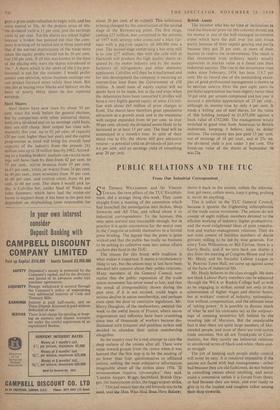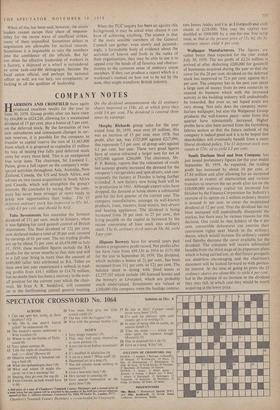PUBLIC RELATIONS AND THE TUC
From Our Industrial Correspondent
SIR THOMAS WILLIAMSON and Sir Vincent Tewson, the twin pillars of the TUC Establish- ment, did a strange thing this week. They came straight from a meeting of the committee which had launched the investigation into Strikes, Shop Stewards and All That, and talked about it to industrial correspondents. To the layman, this may seem normal and reasonable enough, but in practice it is quite uncommon for the senior men in the Congress to submit themselves to a formal press briefing. The legend that the press is quite wicked and that the public has really no business to be poking its collective nose into union affairs anyhow dies hard in the TUC.
The reason for this break with tradition is what makes it important. It seems a revolutionary thing to say, but the unions may at last have been shocked into concern about their public relations. Many members of the General Council now realise that the public reputation of the trade union movement has never stood so low, and that the streak of irresponsibility shown during the past year, if it is not excised, could begin a serious decline in union membership, and perhaps even open the door to restrictive legislation. Mr. Harry Douglass, of the steelworkers, pointed this week to the awful lesson of France, where union organisation and influence have been crumbling since tens of thousands of workers became dis- illusioned with frequent and pointless strikes and decided to abandon their union membership altogether.
So the inquiry may be a real attempt to cure the deep malaise of the unions after all. There were some inward groans from the cynics when it was learned that the first step is to be the sending of no fewer than four questionnaires to affiliated unions, seeking the most exhaustive information imaginable about all the strikes since 1956. 'Si monumentum requiris, circumspice,' they said. 'London Airport, Briggs, Smithfield, British Oxy- gen, the honeymoon strike, the foggy airport strike, , • .' This just meant that the old formula was to be used, said Use Men Who Had Been Here Before:
shove it back to the unions, collate the informa- tion, get more, collate more, keep it going, prolong it, never do anything.
This is unfair to the TUC General Council, because it ignores the frightening schizophrenia of the trade union movement. The unions do not consist of eight million members devoted to the efficient working of industry, higher productivity, and the most enlightened ideas of joint consulta- tion and worker-management relations. They do not even consist of limitless numbers of docile privates_ willing to be led by wise generals. For every Tom Williamson or Bill Carron, there is a -Gerry Healy, and if we turn back our diaries a day from the meeting at Congress House and visit Mr. Healy and his Socialist Labour League in St. Pancras Town Hall, we come up against some of the facts of industrial life.
Mr. Healy believes in the class struggle. He does not think Labour -Party members can be educated through the WEA or Ruskin College half as well as by engaging in strikes, aimed not only at the achievement of higher wages and shorter hours, but at workers' control of industry, nationalisa- tion without compensation, and the ultimate issue of 'taking power.' It is possible to dismiss much of what he and his comrades say as the outpour- ings of amusing eccentrics left behind by the receding tide of Marxism. But the unpalatable fact is that there are quite large numbers of like- minded people, and most of them are over-active trade unionists. Not all are Trotskyists or Com- munists, but they mostly see industrial relations in unrelieved terms of black-and-white, them-and- us struggle.
The job of keeping such people under control will never be easy. It is rendered impossible if the unions are faced with bad managements---either bad because they are old-fashioned, do not believe in consulting unions about anything, and never make a concession unless it is forced from them; or bad because they are weak, and ever ready to give in to the loudest and toughest talker among their shop stewards.
When all this has been said, however, the union leaders cannot escape their share of responsi- bility for the recent wave of unofficial strikes, many of them unjustified. Sometimes delays in negotiation are allowable for tactical reasons. Sometimes it is impossible to take the members into the confidence of the officials. But far too often the effective leadership of workers in a factory, a shipyard or a wharf is surrendered to some rank-and-file demagogue, because the local union official, and perhaps his national officer as well, are -too lazy, too complacent, or lacking in all the qualities of leadership.
When the TUC inquiry has been set against this background, it may be asked what chance it can ha re of achieving anything. The answer is that if the more sensible members of the General Council can gather, even slowly and painstak- ingly, a formidable body of evidence about the activities of knaves and fools in the ranks of their organisations, they may be able to use it to appeal over the heads of all fanatics and obstruc- tionists to the common sense of ordinary union members. If they can produce a report which is a workman's manual on how not to be led by the nose, they might transform British industry.







































































 Previous page
Previous page